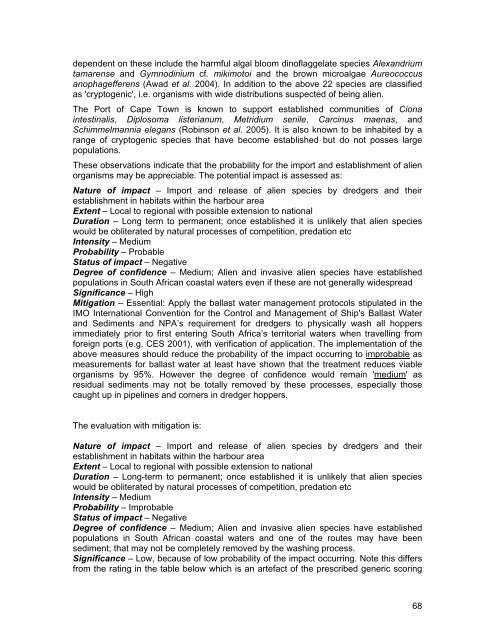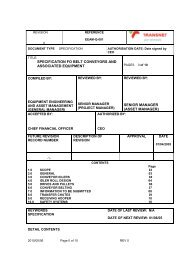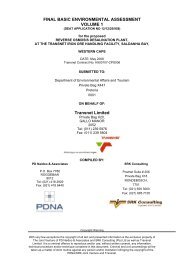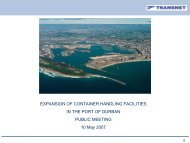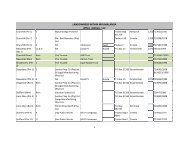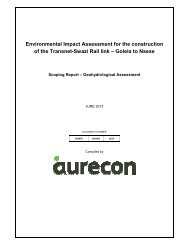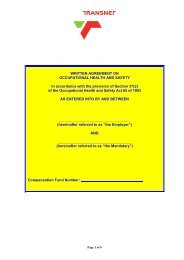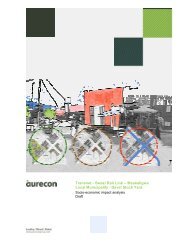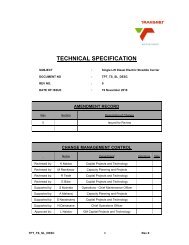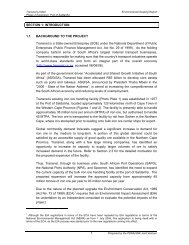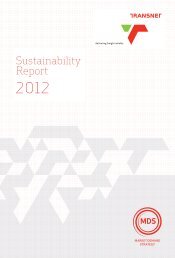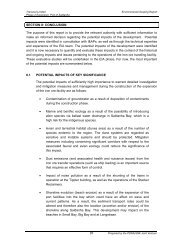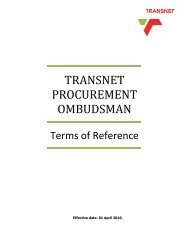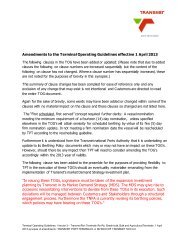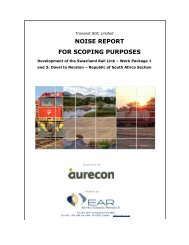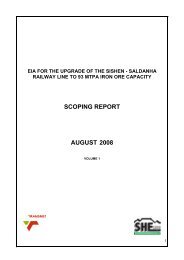BEN SCHOEMAN DOCK BERTH DEEPENING Specialist ... - Transnet
BEN SCHOEMAN DOCK BERTH DEEPENING Specialist ... - Transnet
BEN SCHOEMAN DOCK BERTH DEEPENING Specialist ... - Transnet
You also want an ePaper? Increase the reach of your titles
YUMPU automatically turns print PDFs into web optimized ePapers that Google loves.
dependent on these include the harmful algal bloom dinoflaggelate species Alexandrium<br />
tamarense and Gymnodinium cf. mikimotoi and the brown microalgae Aureococcus<br />
anophagefferens (Awad et al. 2004). In addition to the above 22 species are classified<br />
as 'cryptogenic', i.e. organisms with wide distributions suspected of being alien.<br />
The Port of Cape Town is known to support established communities of Ciona<br />
intestinalis, Diplosoma listerianum, Metridium senile, Carcinus maenas, and<br />
Schimmelmannia elegans (Robinson et al. 2005). It is also known to be inhabited by a<br />
range of cryptogenic species that have become established but do not posses large<br />
populations.<br />
These observations indicate that the probability for the import and establishment of alien<br />
organisms may be appreciable. The potential impact is assessed as:<br />
Nature of impact – Import and release of alien species by dredgers and their<br />
establishment in habitats within the harbour area<br />
Extent – Local to regional with possible extension to national<br />
Duration – Long term to permanent; once established it is unlikely that alien species<br />
would be obliterated by natural processes of competition, predation etc<br />
Intensity – Medium<br />
Probability – Probable<br />
Status of impact – Negative<br />
Degree of confidence – Medium; Alien and invasive alien species have established<br />
populations in South African coastal waters even if these are not generally widespread<br />
Significance – High<br />
Mitigation – Essential: Apply the ballast water management protocols stipulated in the<br />
IMO International Convention for the Control and Management of Ship's Ballast Water<br />
and Sediments and NPA’s requirement for dredgers to physically wash all hoppers<br />
immediately prior to first entering South Africa’s territorial waters when travelling from<br />
foreign ports (e.g. CES 2001), with verification of application. The implementation of the<br />
above measures should reduce the probability of the impact occurring to improbable as<br />
measurements for ballast water at least have shown that the treatment reduces viable<br />
organisms by 95%. However the degree of confidence would remain 'medium' as<br />
residual sediments may not be totally removed by these processes, especially those<br />
caught up in pipelines and corners in dredger hoppers.<br />
The evaluation with mitigation is:<br />
Nature of impact – Import and release of alien species by dredgers and their<br />
establishment in habitats within the harbour area<br />
Extent – Local to regional with possible extension to national<br />
Duration – Long-term to permanent; once established it is unlikely that alien species<br />
would be obliterated by natural processes of competition, predation etc<br />
Intensity – Medium<br />
Probability – Improbable<br />
Status of impact – Negative<br />
Degree of confidence – Medium; Alien and invasive alien species have established<br />
populations in South African coastal waters and one of the routes may have been<br />
sediment; that may not be completely removed by the washing process.<br />
Significance – Low, because of low probability of the impact occurring. Note this differs<br />
from the rating in the table below which is an artefact of the prescribed generic scoring<br />
68


